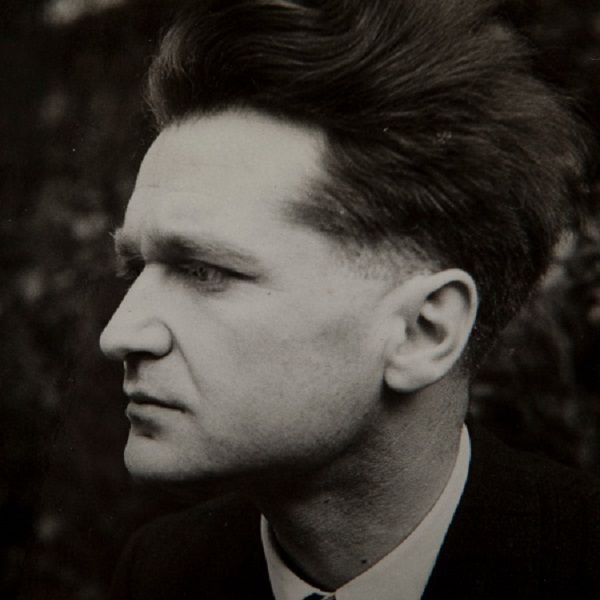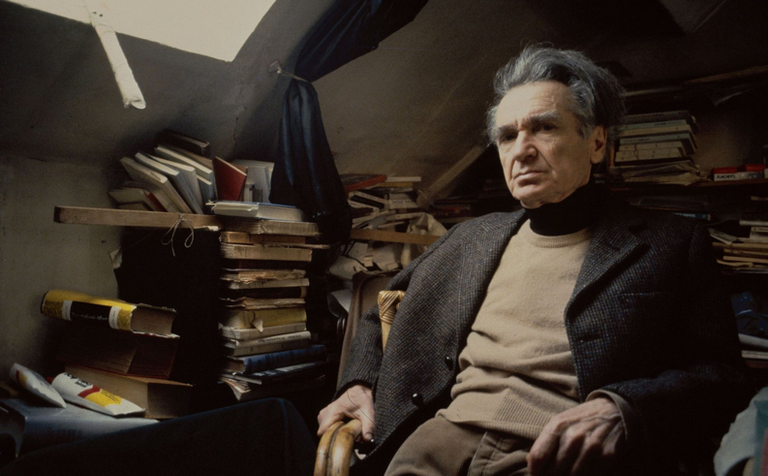
Émile Michel Ciorane Romanian philosopher and essayist. He spent most of his life in France (since 1937), living in the Latin Quarter of Paris. The group includes well-known representatives of Romanian emigration such as Mircea Eliade and Eugen Ionesco. Great ugly, thinker, moralist Emil Cioran was the last legendary writer. By avoiding the spotlight and ignoring the honors, he managed to preserve his mystery. He did not even bother to correct the inaccuracies that the encyclopedias and directories regularly allowed him to address. Cioran is characterized by the fragmentary style - his books consist mainly of short essays and aphorisms. Implications for his attitude are philosophers such as Friedrich Nietzsche and Lev Chestov, although in his later texts he denies the philosophical directings and appeals to the French moralists of the 17th century. He was born on 8 April 1911 in the village of Rasinari, near the medieval city of Sibiu in Transylvania, Romania. There he experiences a beautiful, cloudless childhood: he runs on the hills and listens to how the shepherds tell their tales springing from the depths of time. In 1921, when he was ten years old, they brutally extracted him from this bliss. His father, an Orthodox priest (from whom he is ashamed of his profession) sends him to study at Sibiu's high school. At that time, this old and beautiful city was inhabited by Romanians, Germans and Hungarians. Seven years later, Cioran went to study philosophy at Bucharest University. The crisis that will shake his life a little later is from that time: the dream leaves him forever. For a moment caught by the idea of suicide, Emil Cioran prefers to follow Friedrich Nietzsche's advice - turning his insomnia into an indispensable means of learning: "In a sleepless night we learn a lot more than all the year's sleep."
Cioran on Suicide
What saved me is the idea of suicide. Without the idea of suicide I would have surely killed myself. What allowed me to keep on living was knowing I had this option, always in sight... But really, without it I could have never endured life. The impression of being stuck down here... For me the idea of suicide is linked with the idea of freedom. I realized that in life, very few people have understood, even really great writers haven't understood anything. People with talent, but who are worth nothing! You can meet someone just like that in the streets or in a bistro, it's a revelation. It's someone who has went in-depth, who has tackled the great problem.
Shining student, Cioran wrote his first twenty-two-year book, in 1933 - "On the verge of despair". For him he began to speak as one of the great hopes of young Romanian literature. They compare it to the emerging (as critic) Eugene Ionesco and the well-known cultural philosopher Mircea Eliade. After a short stay in Berlin, he returned to Romania and became a high school teacher in philosophy in Brasov (1936-1937). It must have been a very tumultuous school year, if we judge the nickname given to him by his students: "The Fool!" Cioran himself says the high school director wanted to draw everyone - he was so happy at his departure! But the Fool must have left indelible traces of his alumni, some of them, after so many decades, went to visit him in Paris. For him, brief education was a valuable life experience: after him he did not want to engage in any other service or professional activity. In 1937, he received a scholarship from the University of Bucharest, which allowed him to go to Paris and there to devote himself to his doctoral dissertation on philosophy. The following years really go through stubborn reading and ... cycling tours all over France, as well as in hard writing, but not in the dissertation - for which it never chooses a theme and a title. At that time, Cioran decides to translate the poetry of Henry Misho, the poet whom he values and loves most, but soon gives up this "hopeless project," in his view, because he decides not to return to his homeland anymore. He deepens himself in the reading and the refinement of his French - for the rest of his life he speaks with accent, but learns to write so perfectly that in time he is recognized by the French themselves as one of the "greatest French stylists of all time" .

In 1947, the Parisian publishing house "Gallimar" was given the manuscript of his "Short Course on Decomposition". But Cioran has to rework it, and then the book goes out in 1949. Critical reviews are positive, but readers remain indifferent. This strange situation will continue for nearly three decades. It should be noted that, unlike Jean-Paul Sartre, then a leading figure in intellectual France, and also in Europe, Cioran is completely unknown. He is also a sworn enemy of Communism. Romanian rulers have jailed his brother and a few friends from Bucharest, and his works are banned throughout Eastern Europe and the Soviet Union. Still, some things allow him to overcome humiliations, failures, and confiscated books. These are, above all, the ties to his closest friends: Eugen Ionesco, Mircea Eliade (the two brilliant representatives of the great Romanian diaspora in the West), Henry Misho, Gabriel Marcel. Then, of course, are his readers, albeit not numerous, but fanatically devoted: "I read all such wacky types ..." Then, even gradually, Emil Cioran emerged from his dead end. In 1965, François Erval published a pocket-book "Short Course on Disintegration" and "Bitter Much Succes" (or "Syllogisms of Bitterness"), which came to the forefront of a new generation of readers - mostly students and educators. Cioran has already been translated into Germany, the United States, Spain, England, Italy. There are a lot of positive criticisms, and the circulation of his books. He's already a true celebrity ... But he remains true to himself. He continues to face the media, to divert literary awards and awards. Faithful to its elegant and distant style, it continues to explore the themes that have conquered it in the early years of Romania: Time and Death, "The Test of Being Born and Living," "The Ruins of the West, Religion, Art, Shakespeare, El Greco, Bach, Jewry, Literature, Language ...
Apocalypse According to Cioran, Documentary movie
On his late glory, Cioran looks like a real misunderstanding. He writes about Jorge Luis Borges, and in fact he means himself: "Being an established writer - this is the most terrible of all possible punishments!" His last book, "Recognizing and Anathems," came out in 1987. And if the rumors of a suicide attempt turned out to be untrue, it was true that since the late 1980s, Cioran had finally abandoned the writing. "Writing is defiling!" He said in one of his rare interviews about the Paris prince. He was reading and walking. Ironically, one of the brilliant minds of the twentieth century suffered from the terrible and incurable Alzheimer's disease. Thirty-five years after he left his homeland to throw an anchor in the Latin Quarter (who loved), this great unconscious, moralist and thinker, one of the last great humanists of our time, died at a Paris hospital on June 17, 1995.
Thanks! I wasn't familiar. Another author for the reading stack.
You are welcome :)